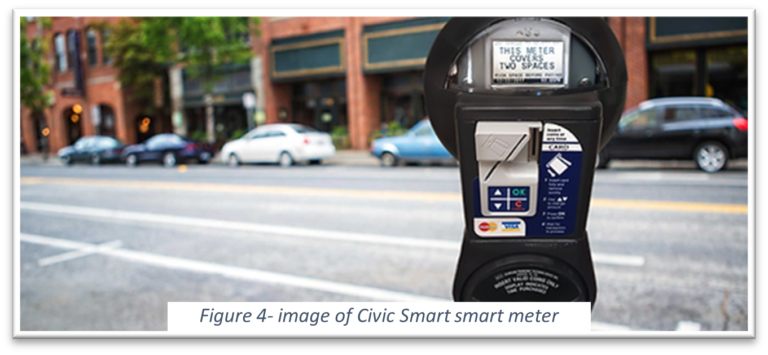Several years ago, we had to confront the reality that all the City’s parking meters were out of date. We needed to replace defective meters, meters that were ruined by theft/vandalism and meters  ‘taken out’ by accidents. We also needed meters for new spaces we were able to create by converting old Bus Stops and condensing lengthy Fire Lanes. Fire trucks do not have time to parallel park in an emergency, so it was determined that the fire lanes didn’t need to be so long. Instead, there should be approximately 7 feet of clearance to have enough room to connect the fire hose. The old meters were/are no longer manufactured
‘taken out’ by accidents. We also needed meters for new spaces we were able to create by converting old Bus Stops and condensing lengthy Fire Lanes. Fire trucks do not have time to parallel park in an emergency, so it was determined that the fire lanes didn’t need to be so long. Instead, there should be approximately 7 feet of clearance to have enough room to connect the fire hose. The old meters were/are no longer manufactured and at some point, they will no longer be supported… meaning, we won’t be able to purchase any of the essential parts needed to keep them operational! With that in mind we began researching the most cost-effective solution(s).
and at some point, they will no longer be supported… meaning, we won’t be able to purchase any of the essential parts needed to keep them operational! With that in mind we began researching the most cost-effective solution(s).
Purchasing more of our outdated meters would have been ‘throwing good money after bad’. Again, they were discontinued and at some point, we will not be able to get the parts needed to keep them operational. They were/are more susceptible to theft and vandalism and do not support any of the “smart” features that are common with current Parking meter technology. The only benefit of the older meters is that meter rates do not have to be raised to offset the additional costs associated with using smart meter features like the following:
- wayfinding (identifying available spaces and directing parkers to them),
- allowing credit card payment at the meter,
- enabling the meter to show paid during an active ParkMobile session,
- accounting features,
- malfunction notifications
 After some initial research and vetting, we decided to implement mobile payments and began a partnership with ParkMobile. ParkMobile would provide some new options to parkers, while giving us more time to determine which parking meters would work best for Shreveport. One of the most significant options ParkMobile provided was the ability to pay for parking without having to use coins. The app allowed parking to be paid by credit/debit card, PayPal, Apple Pay, Google Pay and other means. Additionally, ParkMobile helped us postpone the purchase of more meters by making it possible to pay for parking at spaces that had/have no meter, and it allowed us to offer long-term parking (On-street Permit Parking) on the outskirts of the Central Business District, where there was little to no activity. ParkMobile alone could have replaced our outdated meters, but we believe that parkers should have several payment options: making mobile payments or paying at the meter.
After some initial research and vetting, we decided to implement mobile payments and began a partnership with ParkMobile. ParkMobile would provide some new options to parkers, while giving us more time to determine which parking meters would work best for Shreveport. One of the most significant options ParkMobile provided was the ability to pay for parking without having to use coins. The app allowed parking to be paid by credit/debit card, PayPal, Apple Pay, Google Pay and other means. Additionally, ParkMobile helped us postpone the purchase of more meters by making it possible to pay for parking at spaces that had/have no meter, and it allowed us to offer long-term parking (On-street Permit Parking) on the outskirts of the Central Business District, where there was little to no activity. ParkMobile alone could have replaced our outdated meters, but we believe that parkers should have several payment options: making mobile payments or paying at the meter.
With ParkMobile addressing most of our meter related issues, we were able to take our time and identify a vendor whose product best fit out needs. Civic Smart offered a smart meter that could operate with, or without, the smart features. That option would allow us to purchase current meters and keep meter rates at 50 cents per hr. We could buy smart meters that provide current smart meter functionality, but have the option to implement that smart meter functionality (that requires additional fees) at a later date. This was not the case with other smart meter vendors. If we’d purchased from them, we would have been required to implement the smart meter functionality, and take on the additional costs, at the time of purchase. Without the option to implement smart meter functionality later, we would be forced to double our current meter rate, to $1 per hour to offset the additional costs.
During the Covid lockdown we installed 70+ smart meters that support more than 100 parking spaces. We installed them on our busier blocks, filling holes in meter inventory and replacing outdated meters. The new meters are more secure, and one meter can support multiple spaces. At some point, they can become fully functioning smart meters. That would only require the purchase of an add-on, rather than having to purchase an entire meter. And now you know!



